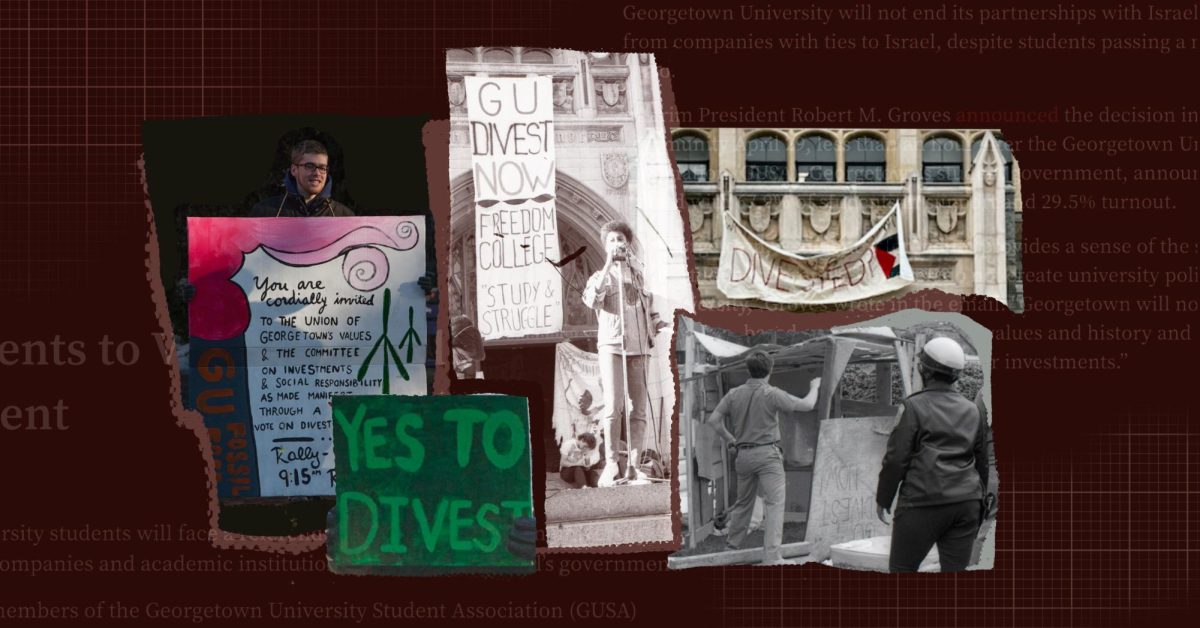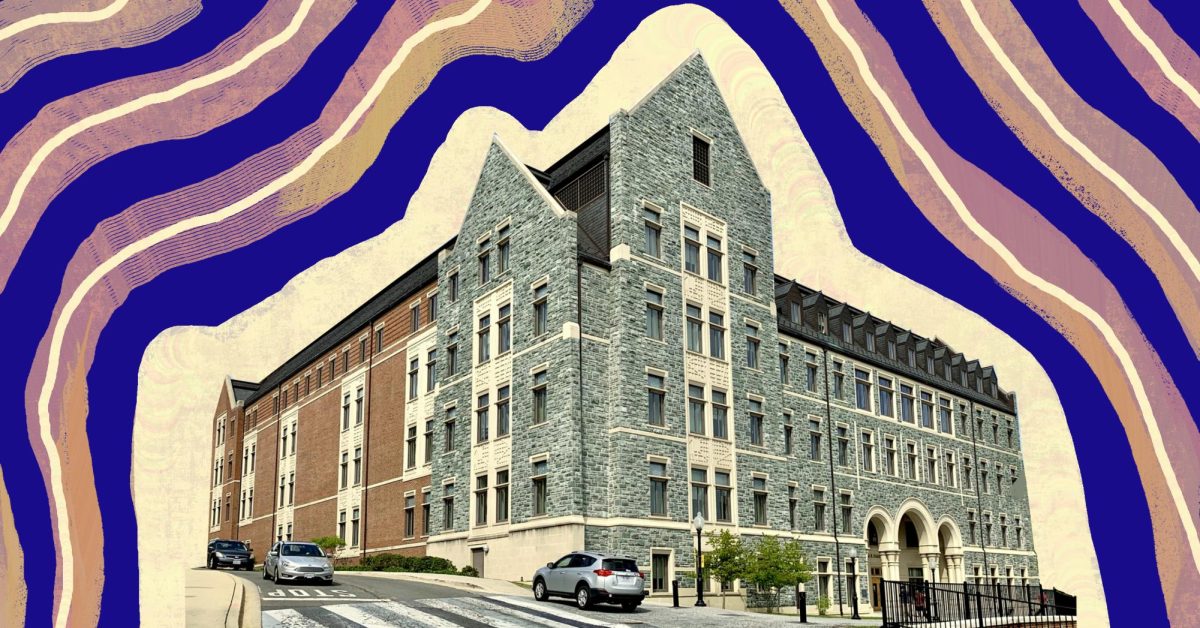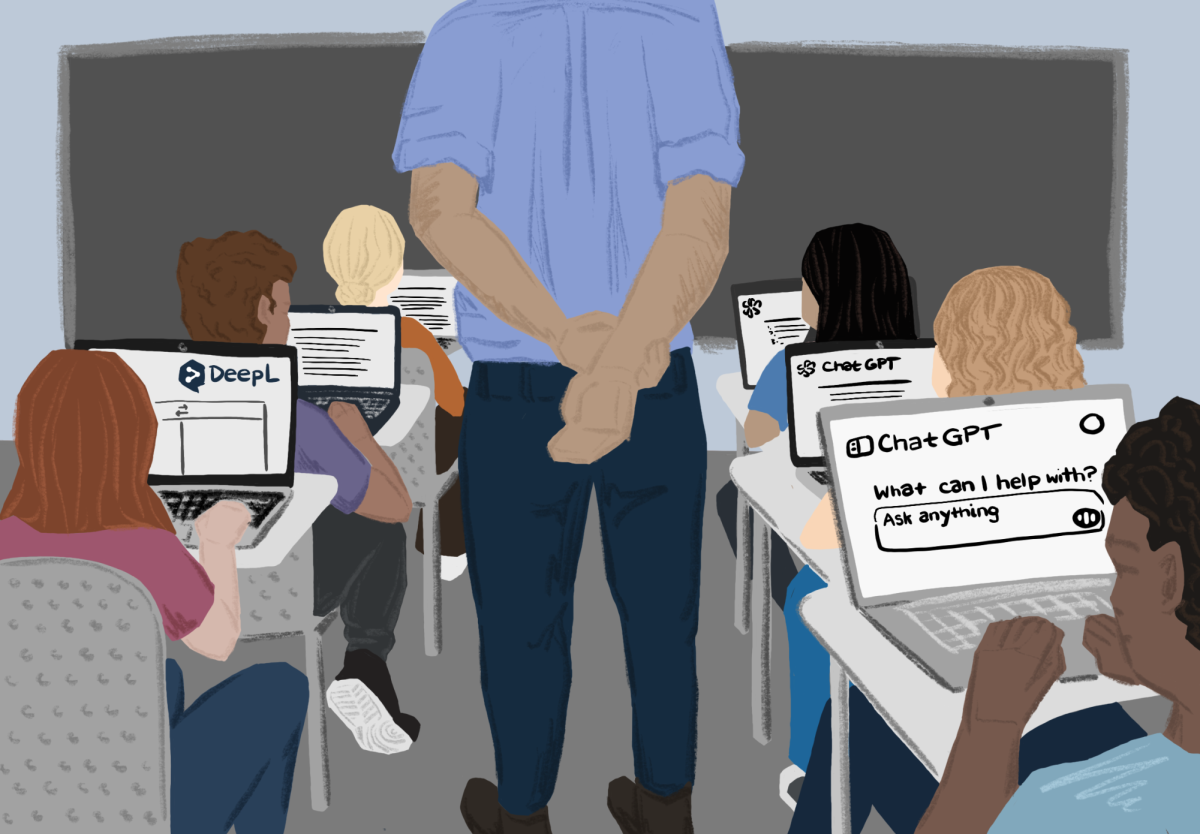Greg Afinogenov, an associate professor in the department of history, was disappointed — though not surprised — by Georgetown University’s move to shore up its finances when it announced a staff and faculty hiring freeze this past April.
What fueled his frustration, however, was the introduction of additional cost-cutting measures that impacted staff benefits a week later, as well as the absence of substantive consultation with affected stakeholders.
Afinogenov — the president of Georgetown’s chapter of the American Association of University Professors (AAUP), an advocacy organization committed to promoting the academic freedom and economic security of faculty across the country — said he has seen his colleagues experience increased stress levels as they contend with the fallout of the new policies.
“It’s really contributed to a sense that staff are barely keeping up, that workloads are accelerating, that there’s just not enough resources to support people,” Afinogenov told The Hoya.
The restriction on new hiring comes amid the federal government’s scaling back much of its previous support for higher education. The cuts have fostered uncertainty surrounding the status of Georgetown’s future federal financial aid and research funding, which totaled $267 million and $195 million in fiscal year 2024, respectively. As part of its overall belt-tightening, the university has also paused annual merit pay increases until at least the end of the calendar year for staff and faculty making more than $50,000 annually and extended the pause to the full fiscal year for senior-level administrators who earn more than $200,000 annually.
A university spokesperson said Georgetown’s leadership is actively tracking federal developments to make appropriate decisions for the institution.
“The fiscal challenges facing Georgetown and all of higher education are significant and require the University to respond appropriately,” the university spokesperson wrote to The Hoya. “University leadership is deeply grateful to faculty and staff for pulling together as we continue to navigate changes from the federal government in areas including research funding, grant aid, student financial aid, international students and other realities.”
A university librarian, who requested anonymity for fear of professional retaliation, said the cascade of cost-cutting measures left staff members in a challenging situation.
“We’re doing whatever we can to still make the experience a great one for everybody, because we love the community,” the university librarian told The Hoya. “Then, on the other hand, there is this low morale.”
“I can imagine that the low morale will seep into the greater campus community,” the librarian added. “It will trickle down to the students in some ways that only time will tell, but definitely not feeling positive about what the future might hold.”
Afinogenov said he has noticed tangible differences in day-to-day operations as a faculty member who works closely with library staff for his research.
“In places like the libraries, it’s also led to a significant overstretch in terms of responsibilities of people,” Afinogenov said. “Many of them were hired as, for example, subject-specific librarians, but then have been forced to cover more and more subjects, including stuff that they weren’t really trained for.”
While the long-term consequences of the hiring freeze and pause on merit pay increases remain to be seen, students, staff and faculty are already feeling effects across the university.
Academic Departments in Flux
For Ariel Glucklich, professor and chair of Georgetown’s theology department, the university’s mandate of austerity meant rescinding admission for one of his department’s four newly admitted doctoral students this past spring.
Glucklich said the university has identified doctoral programs as an area of focus for cost-cutting, because doctoral students don’t pay tuition and receive a university-funded stipend.
“All the departments that have Ph.D. programs — it’s been cut,” Glucklich told The Hoya. “It’s an expense for the university.”
Glucklich said the hiring freeze has also impaired the theology department’s ability to offer a full range of expertise, something that became especially relevant following the retirement of a professor specializing in Christian ethics.
“We can’t even imagine getting it replaced right now under the current conditions,” Glucklich said.
Glucklich said a lack of new, tenure-line faculty replacements would have irreparable consequences for the quality of higher education.
“I think universities are engaged in a kind of rat race to attract students, and that includes nicer dorms and facilities and those kinds of things,” Glucklich said. “But it comes at the expense of the soft stuff: for example, hiring young faculty, tenure-line, who can bring in a dynamic approach to the education.”
“For me, that’s the single most important thing, and that is definitely, definitely suffering,” Glucklich added.
Faculty and staff typically undertake personnel planning in advance, considering short- and long-term student needs as well as extensive community feedback. Sam Halabi, a professor of health management and policy in the School of Health, explained that departments must hire proactively to stay at the forefront of their disciplines.
Halabi said his department has been looking to strengthen its expertise in several emerging fields.
“In health care management and policy, digital interventions — the use of artificial intelligence, applications for patient self-care, for provider innovations, for the clinical interface — are essential,” Halabi told The Hoya. “We really need to build up our faculty presence there.”
Halabi said the hiring freeze puts Georgetown at a significant disadvantage when it comes to recruiting top candidates to its doctoral programs, as candidates would conceivably choose to take their talents to another institution rather than wait for the policy to be lifted.
“It’s a pretty competitive marketplace, so they may go elsewhere, and then you sort of hope that your second choice candidate is sufficiently credentialed that they would be just as welcome,” Halabi said. “You really need to be able to do that pretty nimbly and pretty flexibly in order to serve the students. And so, not being able to do that, it’s not good for the students. It’s not good for the faculty.”
Afinogenov said the hiring freeze has also raised concerns for the diversity of academic offerings as restrictions on hiring limit unique course opportunities.
“Students want to be able to take courses in a variety of subjects, including things that may not be popular with other students,” Afinogenov said. “Faculty want to be able to teach courses in new or unusual or path-breaking areas, and the restrictions — which are very closely linked to restrictions on hiring — are a part of that.”
Glucklich said he feels discouraged about students’ prospects and the university’s academic community at large, as the impacts of cost-cutting measures continue to pan out.
“Sitting around the lunch table and talking about what’s going on, my colleagues are pessimistic,” Glucklich said. “Not long term, there’s a pendulum, but for the next four, five, six years, things will be really tough around the university, mostly for students graduating.”
Personal Costs of Policy Pressures
For many academic departments, the pause on merit payments has disproportionately affected non-tenure-line professors.
Nadia Brown, a professor of government who also directs the women’s and gender studies program, said the pause on merit pay increases has been especially difficult for non-tenure-line faculty, whose salaries are far outmatched by their tenure-line counterparts and often teach three-three loads — three courses in one semester.
“It has a demonstrable effect on my faculty who are teaching a three-three teaching load,” Brown told The Hoya. “Non-tenure-line faculty members, they have lower salaries; they don’t make a living wage.”
Emily Mendenhall, a professor in the School of Foreign Service (SFS), said the changes in pay increase policies have compounding impacts for non-tenure-line faculty, even if they only appear to be short-term changes.
“Missing a year of merit pay is a lot,” Mendenhall told The Hoya. “I’m a full professor and I support my family, so I have a lot of expenses, but I think it probably is more affective of our more junior faculty whose merit pays will be affected their whole career by this because your pay compounds over years.”
Staff have shouldered similar burdens related to the lack of merit pay increases, including the university librarian, who said she felt blindsided by the sudden changes.
“While I’ve previously received the merit increase, not receiving it this year has taken a bit of a financial toll,” the university librarian said. “It was something that I was anticipating and expecting, and when it didn’t occur, that threw a little bit of disarray into what I was foreseeing my financial future to be.”
The university librarian added that, in addition to stomaching the pause on merit pay, she has had to take on new responsibilities to compensate for the understaffing created by the hiring freeze.
“There’s obviously the larger responsibilities that I’m speaking of, but there’s also smaller ones,” the university librarian said. “Taking on a desk shift or something small like that, or being the person to answer more reference questions, or being on the library chat more because there’s less people to choose from.”
A program administrator in the College of Arts & Sciences (CAS), who also requested anonymity for fear of professional retaliation, echoed that the hiring freeze led him to take on an uncomfortable amount of new responsibilities.
“One of our staff positions in my department has been vacant for a year and a half, which has meant that me and the other staff members have had to pick up the slack there,” the program administrator told The Hoya. “So that’s meant that I’ve taken on a lot more responsibility than is comfortable to handle.”
The discrepancy between workload and the number of available personnel across the university has generated pressure for some student workers to assume more responsibilities. In the Office of Residential Living, for example, some university workers said the hiring freeze meant some community directors (CD) — live-in staff members who work to build residential community — shouldered additional responsibilities beyond one dorm.
CC Mesa (SFS ’26), a resident assistant (RA) for Ida Ryan & Isaac Hawkins Hall, said she saw a CD assume additional responsibilities.
“I had to pick up some slack in terms of introducing this new RA to our team, because my boss was running two different teams at the same time,” Mesa told The Hoya. “While he was helping to introduce the new Darnall RA, I helped the new Copley RA set up her floor and get oriented to the job. Those were extra responsibilities that I was not necessarily compensated for.”
Other offices on campus, like the Maker Hub — a collaborative space for 3D printing, laser cutting, woodworking and other creative pursuits — have also experienced understaffing.
Sara Lignell (CAS ’26), a student worker at the Maker Hub, said she has taken on duties previously fulfilled by full-time university staff.
“Our responsibilities have been majorly increased,” Lignell told The Hoya. “For example, I’m now responsible for creating the whole schedule for the 40 volunteers. All of these tasks were previously done by the full-time faculty manager.”
Mendenhall said austerity measures, on the part of both Georgetown and the federal government, caused her to ask herself how to best care for students, faculty and her community as a whole.
“What actually matters? How do we respond?” Mendenhall said. “We respond by supporting each other, right? We are just trying to get by in this time.”
Demands for Disclosure
Students, faculty and university employees said they felt the negative impacts of Georgetown’s hiring freeze, but they also recognized that the decision was a result of the government’s withdrawal of federal funds — a change beyond the university’s control.
Mesa said her increased workload — and the university’s austerity policies — were rooted in the federal government’s funding cuts.
“I understand why the university had to put on this hiring freeze, and, ultimately, it’s more the government’s doing than it is the university’s,” Mesa said. “I had to step up — I’m not necessarily angry at that.”
Vasquez said he believes the government’s actions forced the university to divert its focus from education to daily operations.
“As much as I complain about these issues, I do feel like the real issue does lie in the federal government with the withdrawal of these federal funds,” Vasquez said. “It really does just ultimately affect everyone’s lives here at Georgetown, and it’s forcing the university to operate more on a business level and not focusing as much on education.”
While university employees acknowledged the link between Georgetown’s hiring freeze and the federal government’s actions, some also called for increased transparency from university leadership, particularly regarding “mission-critical” functions and hires.
According to a document attached to Interim President Robert M. Groves’ April 29 email announcing the hiring freeze, the university ceased to fill vacancies not considered “mission-critical” — such as student services, health and safety or strategic needs — unless directly approved by senior administrators.
Halabi said he is concerned by the lack of clarity regarding what constitutes a “mission-critical” position for university faculty.
“There’s no criteria, none that have been released to the faculty,” Halabi said. “So it seems like it’s done when they feel like doing it. It’s entirely possible that there’s a really good reason that fits within some predetermined criteria that exists somewhere, but it speaks to the lack of transparency on all of these decisions.”
Halabi added that this lack of transparency increased fears the university would continue the pause on merit pay increases for faculty moving into the next fiscal year.
“They need to be transparent about the actual bases for the exigency, and if they’re not transparent, then my answer is that I’m worried that they will just decide to keep their money right in December,” Halabi said.
The CAS program administrator said Georgetown ought to more clearly delineate the university’s financial direction so employees can set expectations and plan ahead.
“I would love to see an outlined game plan: What are the steps that they’re prepared to take given certain indicators, whether that be an action by the administration or whether that be an internal indicator?” the program administrator said.
“It doesn’t feel like the provosts or presidents are planning that far ahead, and if they are, they’re certainly not telling us,” the program administrator added. “Which worries us, because why wouldn’t you show your plans unless they’re scary for your workers, for your community members?”
Afinogenov said the university needs to do more to reassure and protect its employees in the face of uncertainty.
“In a moment like this, where there are, objectively, a lot of people who are afraid for their jobs, a lot of people who are afraid for their livelihood, the university could do more to reassure them and to make commitments that they are going to do the most that they can to protect people’s jobs,” Afinogenov said.









